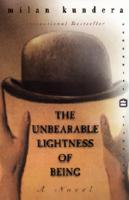SBBC: The Unbearable Lightness of Being by Milan K
Launch gallery slideshow

| Group: | Swap-bot Book Club |
| Swap Coordinator: | bookwyrmm (contact) |
| Swap categories: | Books Letters & Writing |
| Number of people in swap: | 2 |
| Location: | International |
| Type: | Type 2: Flat mail |
| Last day to signup/drop: | October 23, 2010 |
| Date items must be sent by: | November 23, 2010 |
| Number of swap partners: | 1 |
| Description: | |
|
The Unbearable Lightness of Being by Milan Kundera (ISBN 0-06-091465-3). Book Genre: General Fiction/Literature Summary: A young woman is in love with a man torn between his love for her and his incorrigible womanizing: one of his mistresses and her humbly faithful lover—these are the two couples whose story is told in this masterful novel. In a world in which lives are shaped by irrevocable choices and by fortuitous events, a world in which everything occurs but once, existence seems to lose is substance, its weight. Hence, we feel “the unbearable lightness of being†not only as a consequence of our private actions, but also in the public sphere, and the two inevitably intertwine. Swap details: I've set the sign-up date for about three weeks from now to give folks time to pick up a copy and read it a bit (if you wish) before you decide to join this swap, but you can start reading whenever you'd like. For this swap, you can either hand-write or type and send (via snail mail) the answers to your questions. Please use your best judgment. If it elicits a yes or no, please answer it with at least one complete sentence. I would say most questions should be answered with a minimum of a few sentences. The purpose is to create a dialog, a discussion about the book - with your assigned partner, perhaps you will be in touch via e-mail, or private message or through the forum as part of a larger group, or you just want to see what someone else thinks about what we've read. If you only answer yes or no, it doesn't really leave room much room for a discussion. Category 1 (answer all 6 of these questions for your partner)
Category 2 Please pick 4 of the following questions (below) to answer with the above questions. These questions are taken directly from the book’s reading group guide. Please be honest in your answer and use constructive criticism. You can choose to answer more questions below, but you must choose a minimum of 4. If there is something not asked in the questions that you'd like to share, please feel free to discuss that too.
| |
Discussion
Leave a Comment
You must be logged in to leave a comment. Click here to log in.
- Info:
- Home
- |
- About
- |
- Forum Rules
- |
- Terms of Use
- |
- Press
- |
- Advertising
- |
- Blog
- |
- Graphics & Stuff
- Help:
- New User Info
- |
- FAQ
- |
- Group Info
- |
- Glossary
- |
- Forums
- |
- |
- Contact Admin

